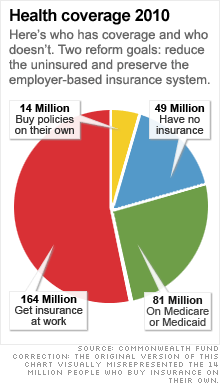The 'new' new tax on the rich
As Congress continues to grapple with how to pay for health care reform, taxing the wealthy is still in play. Just how wealthy is the next question.

NEW YORK (CNNMoney.com) -- The definition of "rich" may be going up should lawmakers choose to impose extra taxes on the wealthy to pay for health reform.
Three committees writing the lead House bill have called for an additional tax to be imposed on income above $280,000 for singles and $350,000 for married couples. The so-called surtax would run as high as 5.4% on income over $1 million.
But House Speaker Nancy Pelosi, D-Calif., this week began pushing for the surtax to apply only to singles making more than $500,000 and couples making more than $1 million.
President Obama also gave a nod to raising the threshold.
"To me, that meets my principle that [the cost of health reform is] not being shouldered by families who are already having a tough time," Obama said at his primetime news conference Wednesday.
A surtax is a tax on top of a person's ordinary income tax. In the case of the House-proposed surtax, the income over the threshold would be taxed at both the top income tax rate -- scheduled to be 39.6% --plus the surtax rate.
The Joint Committee on Taxation estimated that the surtax under the $280,000/$350,000 proposal would raise $544 billion over 10 years.
Much of that revenue would come from households making more than $1 million, said Roberton Williams, a senior fellow at the nonpartisan Tax Policy Center. So a higher threshold for the surtax is likely to retain most of the revenue gain, although no official estimates have been done.
The original proposal would affect 1.2% of Americans, according to the JCT. If the income thresholds were increased, the surtax likely would affect a smaller percentage of people. Data from the Tax Policy Center suggest that by 2011, fewer than 450,000 households could be subject to the surtax if the thresholds are raised.
The higher thresholds are not a forgone conclusion since the House Ways and Means Committee, which has jurisdiction over tax matters, already passed the health reform bill with the original surtax thresholds.
But with Pelosi backing higher levels and a tacit agreement from the president, the chances are good that they could make it into an amendment once the health reform bill is considered by the full House, which may or may not happen before lawmakers leave town in August.
Ultimately, though, the fate of a surtax at any threshold may be called into question once the Senate Finance Committee -- the Senate's tax-writing body -- releases its proposals to pay for health reform.
One idea that committee is considering is a tax on insurers that offer high-priced plans.
Either way, don't expect a decision any time soon.
The Senate committee hasn't even released its draft bill for health reform. So it won't be able to mark it up and vote the bill out of committee and onto the Senate floor until the fall.
And only after both the House and Senate have voted on their respective bills will the real negotiations begin as both chambers seek to reconcile their different versions. ![]()

